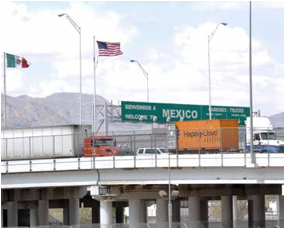CommentsLA WATCHDOG--President Trump is threatening to trash the 23 year old North American Free Trade Agreement (“NAFTA”) because he is bent out of shape by our $63 billion trade deficit with Mexico. But that would be a huge error and not in the best interests of the United States and Southern California.
NAFTA was designed to create a free trade zone between the United States, Canada, and Mexico with the goal of integrating the three national economies through increased trade and cross-border investments. This would result in higher growth for the developing Mexican economy, provide more job opportunities in Mexico, open the previously protected Mexican market for American and Canadian imports and services, and improve the competitiveness of North America with the rest of the world.
 In many ways, NAFTA has been a success with cross-border trade tripling from 1993 to $1.1 trillion and direct U.S. investment soaring seven times to over $100 billion.
In many ways, NAFTA has been a success with cross-border trade tripling from 1993 to $1.1 trillion and direct U.S. investment soaring seven times to over $100 billion.
But during this time, the balance of trade went from a U.S. surplus of almost $2 billion in 1993 to a deficit of $63 billion. NAFTA has also been blamed for the loss of manufacturing jobs, especially in the auto industry in the Midwest, putting downward pressure on domestic wages, and lowering environmental and labor standards.
While the Mexican economy improved, its growth rate did not meet expectations.
On the other hand, many new, well-paying trade related jobs have been created in the USA, many of which are in Southern California, Canada, and Mexico.
While President Trump is tweeting about the trade deficit with neighboring Mexico, the real bad hombre is China, a mercantile society that does not play by the rules, with whom we have a $350 billion trade deficit.
In any negotiations involving NAFTA, the USA needs to consider the impact of any action on our competiveness and overall balance of trade. Over the last 23 years, our three economies have become more interdependent as a result of billions in cross border investments and the development of sophisticated supply chains that involve the back and forth movement of goods.
 There are also a number of other factors that impacted the deficit and level of trade and investment, including the increasing globalization of trade, the rapid changes in manufacturing technology and logistics, changes in domestic policies and demographics (including the significantly lower birth rate in Mexico), and the rise of aggressive Chinese mercantilism.
There are also a number of other factors that impacted the deficit and level of trade and investment, including the increasing globalization of trade, the rapid changes in manufacturing technology and logistics, changes in domestic policies and demographics (including the significantly lower birth rate in Mexico), and the rise of aggressive Chinese mercantilism.
The USA also needs to recognize that while our southern neighbor has issues with public corruption, drugs, and cartels, we share a 2,000 mile border with Mexico. As such, it is of paramount importance that we have a prosperous and stable neighbor that we can work with in a constructive and civilized manner. And that is worth a lot, especially in the current environment of terrorists, drugs, and illegal immigration.
Just imagine if Mexico went the way of Venezuela.
All this is to say that we need to preserve and strengthen our “special” relationship with Mexico (population: 127 million) and Canada (population: 36 million). Together, along with 320 million Americans, many of which have Mexican and Canadian ancestry, the three NAFTA countries are a powerful economic bloc of almost 500 million people with a combined gross domestic product of more than $21 trillion, exceeding that of the European Union and its 28 member nations.
NAFTA may require some modifications to help lower our trade deficit and ease other tensions. But President Trump and the more rational people in Washington and corporate America need to realize that we are stronger together than individually before they do something that is not in our best interests.
And as a reminder, there is growing number of Mexican Americans who vote.
(Jack Humphreville writes LA Watchdog for CityWatch. He is the President of the DWP Advocacy Committee and is the Budget and DWP representative for the Greater Wilshire Neighborhood Council. He is a Neighborhood Council Budget Advocate. He can be reached at: [email protected].)
-cw
















